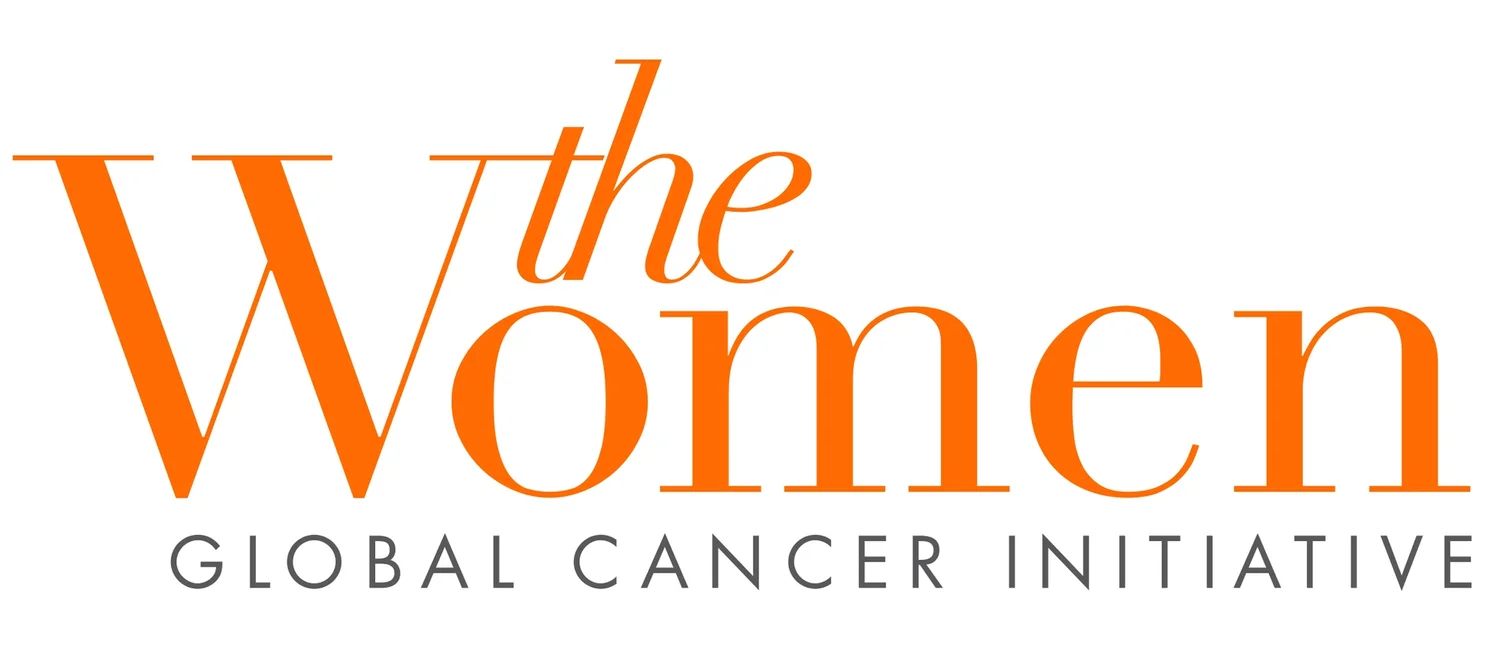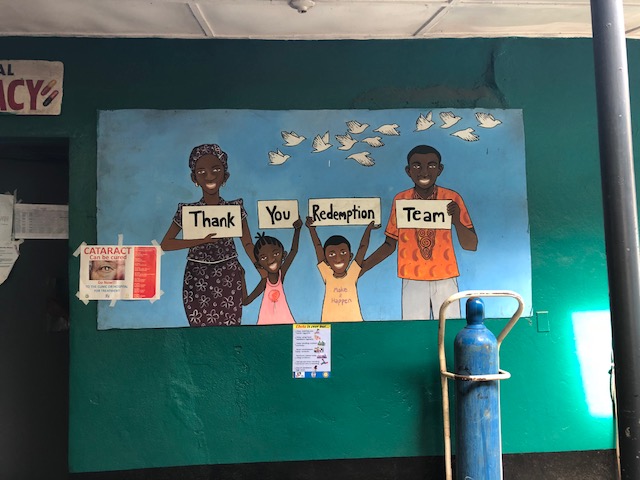Redemption Hospital, where I was slated to work for a week, is located in New Kru Town, a northwestern coastal suburb of Monrovia, located on the north end of Bushrod Island. The area around the hospital is basically a slum with tightly arranged ramshackle buildings. Most daily activities, like bathing, cooking, filling of gas tanks from jars, selling of live animals and various merchandise are all occurring in between the shacks and the poorly maintained road.
It’s hot and humid, bustling, very crowded, dusty and loud. Redemption Hospital is a former marketplace turned hospital with seemingly randomly placed cinder block shacks and open walkways in between. Redemption offers care to all patients free of charge and was one of the hotspots during the recent Ebola epidemic that caused unspeakable suffering and countless deaths, including 12 healthcare workers employed by the hospital. Diesel generators are humming in the stifling heat and exhaust is pouring into the walkways and open buildings. It reeks of feces and urine. There is trash, latrines overflowing with fecal matter and tissues, and used bedpans all around. Amidst the unsanitary chaos, a young toddler is receiving a bucket shower. It’s Monday and the cleaning crew just arrived.
From left to right: Theresea Caphart RN, Whitney Lieb MD, Janice Urey RN, me
After a maze of walkways, we arrive at the HIV clinic, which is located at the very back of the compound. The clinic provides care for about 5000 people living with HIV. Theresa and Janice, the two nurses who run the clinic, are there to greet us and have already triaged some of the patients waiting for us. They are very welcoming and graciously allow us to use the only room of the clinic with electricity, air-condition and glass windows.
We scrub everything down with bleach wipes and set up a make shift high-resolution anoscopy (HRA) clinic with the supplies we brought. The entire hospital, we’re told, is out of gloves and the Diesel fuel for the generator that provides electricity for the hospital is predicted to run out 2 days after our visit without a new delivery in sight. Luckily, we brought most of the needed supplies, including gloves.
HRA and STI supplies brought from New York
We have busy clinic days. Most patients we see for HRA are men who have sex with men (MSM) who were previously screened at SAIL (Stop AIDS in Liberia). SAIL is a not-for-profit NGO that focuses mainly on supporting people living with HIV as well as on HIV/AIDS and STI prevention among high-risk groups, particularly LGBTQAI+ and commercial sex workers. The current project started in August of 2017 in partnership with SAIL. 100 MSM performed self-collected anal swabs to detect oncogenic anal HPV. The purpose of this present trip is to screen and treat those participants (~ 50 out of 100) who tested positive.
Most of the patients we see are HIV positive and already treated with ARVs. CD4 counts, HIV viral loads, and other lab tests are not routinely performed but ARVs are provided for free. Therapy typically consists of single tablet TDF/3TC/EFV.
Homosexual acts are illegal in Liberia and homophobia is widespread. Engaging MSM in care in a safe setting that they trust is therefore a challenge. There are also transgender women among the patients. They identify as women but are only able to dress their preferred gender, wear make-up and wigs, and express themselves in “safe spaces.” We’re told that many of them have been raped and beaten by police or other community members. Many exchange sex for money to make a living. Towards the end of our stay, word of us being available at the clinic and treating patients respectfully gets around and many patients who have not participated in the original screening project show up to receive care for various complaints. Some of those patients are unaware of their HIV status and we offer testing using oral swabs for HIV antibodies with test kits we brought with us from New York. It’s heartbreaking to convey many new HIV diagnoses.
From left to right: me, Jennifer Henshaw, Executive Coordinator Lesbian and Gay Association of Liberia (LEGAL), Stephen Mcgill Excutive Director of SAIL, Whitney Lieb
We see a variety of STIs, none of which we can reliably diagnose given the lack of testing infrastructure. We base our decision to treat on symptoms or the presence of urethral discharge, dysuria or proctitis. It is astounding how many cases of scabies we encounter, some very extensive with crusted lesions and wide dissemination. We’re able to procure acyclovir from the hospital pharmacy and use most of the azithromycin we brought for ourselves to take in case of traveler’s diarrhea for the treatment of presumed STIs. We are also able to get ceftriaxone IM from a local pharmacy (1 g costs 1 USD). Unfortunately, permethrin is not available and neither is ivermectin, which would have been the preferred treatment given the extent of disease in some patients. Instead, we buy a few bottles of benzyl benzoate which is used locally to treat scabies and hand it to patients who need it.
I perform HRA on patients who participated in the self-collection of anal swabs and tested positive for oncogenic HPV. Given the lack of availability of histopathology services, I cannot biopsy lesions suspicious for HSIL and I instead treat them either with infrared coagulation, TCA and/or sharp excision. There are several patients with too much pathology to treat in an office setting; they will hopefully be treated later this year by a visiting colorectal surgeon. Luckily, none of the patients we see have lesions suspicious for anal cancer.
Performing HRA
All patients seem grateful for our service (there are usually no physicians staffing the HIV clinic) and ask when we will be back. Many want to bring their friends to also receive care. The transgender patients are gleaming when we address them with their preferred name and pronoun. It feels fulfilling to be able to provide some glimmer of hope in their lives and treat them with the respect they yearn for and deserve. The abysmal circumstances (living conditions, lack of hygienic standards, the broken healthcare system) these patients are challenged by every day make it hard to be hopeful that we’ve made a lasting impact.
Besides the patients we treated, the remarkable men and women from both Liberia and abroad, who are trying to make a difference in these patients’ lives, impressed me profoundly and made my trip worth it many times over. I met aid workers from various organizations and backgrounds, volunteers, community activists with sincere and selfless determination. In a world where half-truths or outright lies, self-serving actions and greed seem to prevail, it was soothing to meet so many individuals dedicating their time and effort to provide some relief to the situation in Liberia.
Mural at Redemption hospital before as you walk into the facility.
I will definitely go back to Liberia and I am truly elated by the experience, though I will admit I was glad to escape the chaos towards the end of our stay.
Some unrelated highlights were watching the sun set over the Atlantic Ocean, and a glorious beach day before we left Liberia. I would like to extend a heartfelt thank you to my new friend Dr. Whitney Lieb. She is easily the most energetic, positive, kind and selfless person I’ve met in a long time. Even a significant food borne illness could not stop her enthusiasm and drive. Without her, none of what we were able to accomplish would have been possible. I would also like to sincerely thank the Division of Global Women’s Health under the leadership of Dr. Beddoe who supported my trip and entrusted me with the care of this vulnerable population.
About the author: Dr. Michael Gaisa is an MD PhD, he is the Director of the Mount Sinai Anal Dysplasia program. He also specializes in HIV infection, sexually transmitted infections, anogenital HPV infection and men's health. Funding for Dr. Gaisa's trip was provided by thewomen.org.






